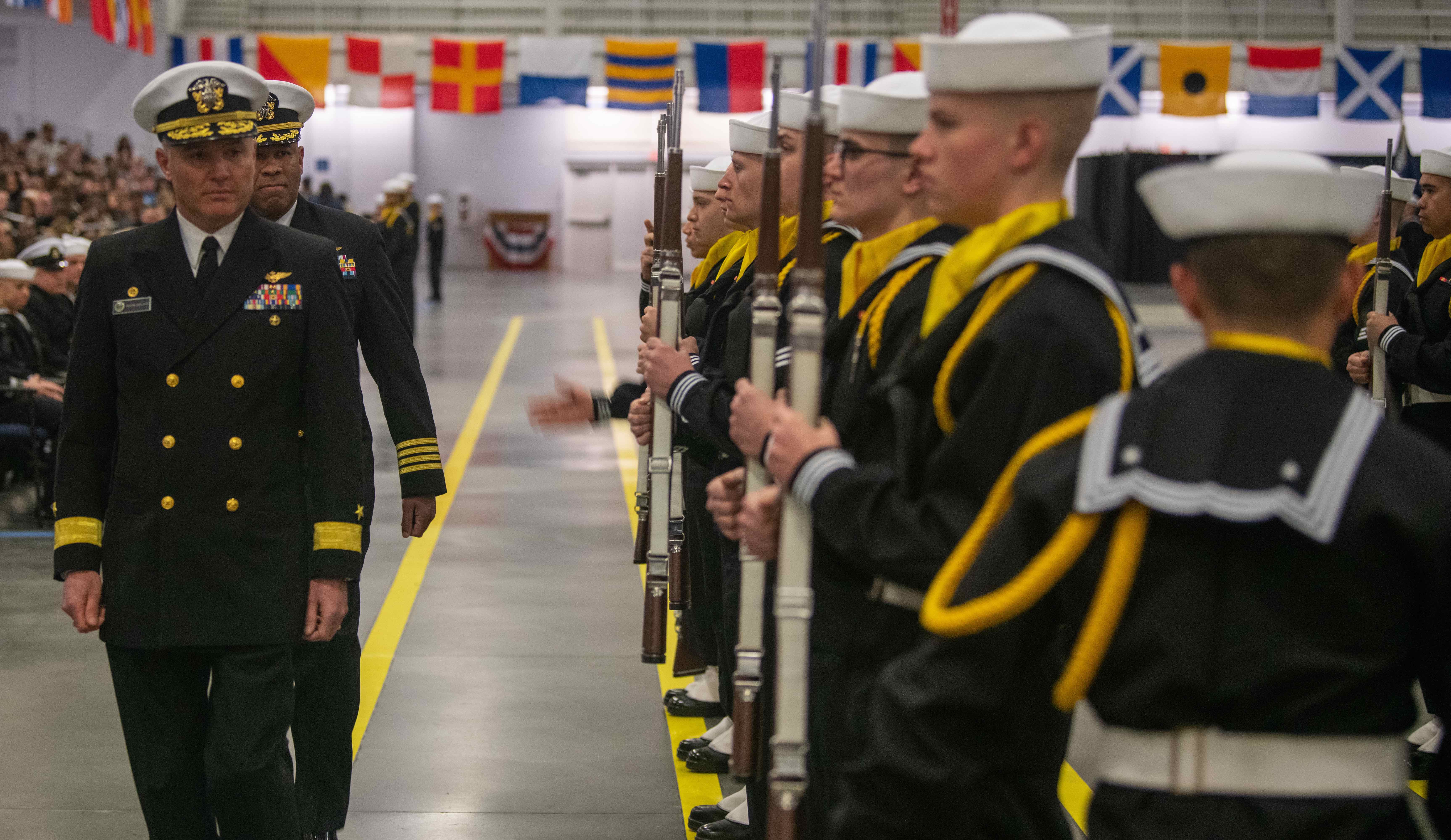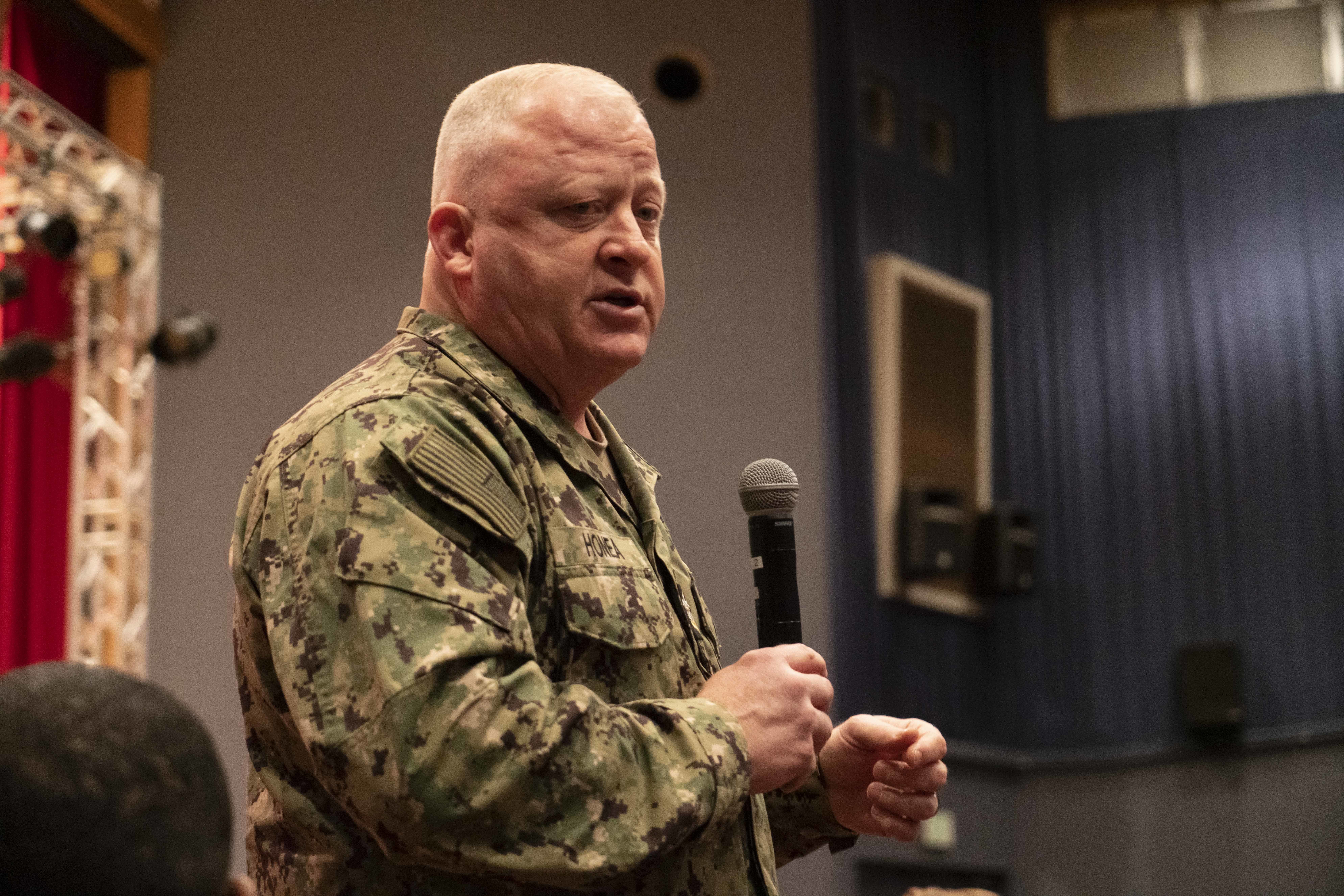
THE PENTAGON – As part of the Fiscal Year 2024 budget request, the Navy is placing a focus on recruitment, retention and quality of life issues as it seeks to add 5,000 sailors to the ranks next year.
The Navy’s budget request includes funding for a pay raise, as well as a litany of personnel-focused items. Adding in a focus on personnel continues the Navy’s attention to areas such as suicide prevention and sexual assault.
Focusing on people makes sense, Master Chief Petty Officer James Honea said.
“The people are what make those ships lethal,” Honea told USNI News in an interview this week.
In FY 2024, the Navy requested to spend $38.5 billion to support an end strength of 347,000, according to the personnel budget book released by the Navy.
The $38.5 billion includes pay for sailors and midshipmen, as well as a permanent change of station and other personnel costs, according to budget documents. The military overall will see a 5.2 percent pay raise, Michael McCord, the Pentagon’s top budget officer, said during a March 13 budget briefing.
Despite facing challenges with recruitment, the Navy’s FY 2024 budget calls for an increase in both average and end strength compared to Fiscal Year 2023.
FY 2023 has end strength at 341,736 and average strength at 343,465, according to the personnel budget book. That’s an increase of 5,264 for end strength in FY 24 and 2,689 for average strength. Numbers for FY 23 and 24 are estimates.
In order to meet the FY 2024 personnel goals, the Navy will need to meet 39,500 active-duty enlisted accessions, according to the budget books. The FY 2023 goal is 37,700, USNI News previously reported.
The Navy’s budget request also includes funding for increased mental health care services, said Undersecretary of the Navy Erik Raven during a March 13 budget briefing.
“This request adds $29 million and expands programs like sailor assistance and intercept for life (SAIL), the command individual risk and resiliency assessment system, and adds two additional warrior toughness teams,” Raven said.
Mental health care has been a challenge for the Navy, as well as the military as a whole, Honea said, due to the overburdened providers in the service. That often means that sailors have to seek services outside of the military.
Sailors have suggested that the Navy remove a referral requirement for telehealth appointments for mental health care, an idea Honea supports.
Funding in the budget will also go toward sexual assault prevention and childcare centers, Raven said.
Childcare has become another large issue facing the Navy, and the military as a whole. Staffing shortages have made it more difficult to find enough employees to run the centers, Honea said.
The Navy is looking to increase capacity where it can, Honea said. It’s also examining increasing wages to attract more childcare workers, while also looking at what partnerships might be available with local childcare businesses.
Funding in the budget will also go to quality housing, especially for sailors and Marines who are at industrial shipyards, Raven said.
Housing is an area of focus for Honea, who heard from sailors about housing during a recent Reddit Ask Me Anything.

“I want there to be greater access for all sailors to have housing off ship,” Honea told USNI News. “I want there to be a greater separation from their work life and their home life. I want every sailor to have a barracks room or to have an apartment or housing outside the fence line.”
Sailors need to have personal space, something that is hard to come by when living on a ship, outside of a deployment. They also need a chance to be able to step away from work, Honea said.
“That’s just to treat them as good humans, as people,” he said. “But I think that’s necessary for their mental wellbeing.”
Treating sailors better could summarize most of the objectives Honea has as MCPON. He wants sailors to be able to talk to him, but he also wants them to have the confidence and trust to be able to go to their leaders with their concerns.
Leaders need to develop soft skills, as well as their technical Navy skills, he said. The Navy is using enlisted leadership development programs to help train facilitators who then can train leaders.
Learning soft skills and growing emotional intelligence is not a sign the Navy is getting soft, Honea said. The Navy is operating forward, certified and ready, he said.
The sailors today are just as qualified as the ones he served with early in his Navy days. They’re even healthier, he said, noting that alcohol and tobacco use is down since he joined the sea service.
And the soft skills he wants leaders to have are not new either. Honea talked about how his own commanders made sure he was able to attend the birth of his son as an example of leaders caring for their sailors.
Sailors and officers are each other’s families when abroad, Honea said.
“We need to be better attuned and take better care of one another,” he said.





